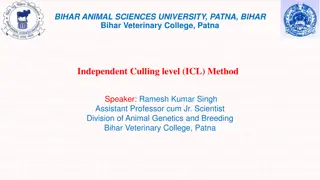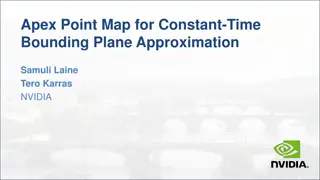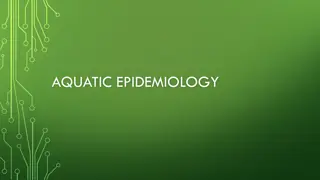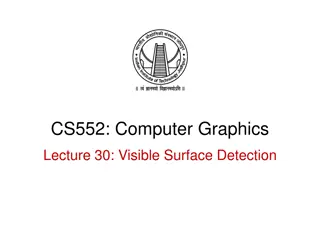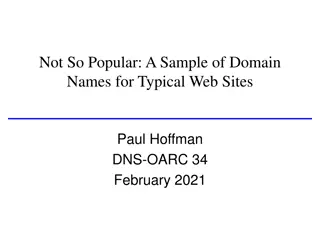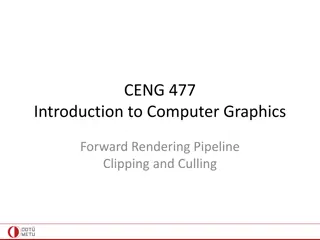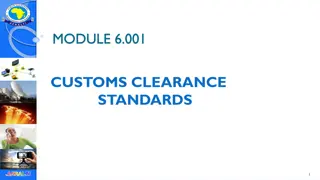GPU Rasterization and Graphics Pipeline
Delve into the world of GPU rasterization, from the history of GPUs and software rasterization to the intricacies of the Quake Engine, graphics pipeline, homogeneous coordinates, affine transformations, projection matrices, and lighting calculations. Explore concepts such as backface culling and dif
1 views • 17 slides
Independent Culling Level (ICL) Method in Animal Breeding
The Independent Culling Level (ICL) method involves selecting multiple traits simultaneously in animal breeding. Breeders set minimum or maximum culling levels for each trait, ensuring continuous improvement in desired characteristics through successive generations. However, challenges exist in dete
0 views • 6 slides
Efficient Bounding Plane Approximation Techniques in Computer Graphics
Discover advanced techniques for quickly finding optimal bounding planes with specific orientations in computer graphics applications such as ray tracing, world-space optimization, view frustum culling, and shadow mapping. Learn how to improve efficiency and precision in bounding volume hierarchy co
0 views • 28 slides
Graphics Pipeline Clipping Techniques
Delve into the intricate process of graphics pipeline clipping in computer graphics, from breaking primitives into fragments to determining visible parts for rendering. Explore the necessity of clipping, culling, and endpoint conditions, as well as techniques like Cohen-Sutherland Line Clipping. Gai
0 views • 18 slides
Graphics Pipeline Clipping Techniques
Explore the concepts of graphics pipeline clipping, including object-order rendering, vertex and fragment processing, visibility, blending, reasons for clipping, culling, and various methods like line and endpoint clipping. Dive into algorithms like Cohen-Sutherland for efficient line clipping.
0 views • 18 slides
Advanced Graphics and UIs Rendering Pipeline
Explore the intricate details of the rendering pipeline in advanced graphics and user interfaces, including clipping and culling processes. Learn about the sequence of operations involved in drawing primitives, the evolution of APIs like OpenGL and D3D, and the various stages from vertices to visibl
0 views • 52 slides
Conservation Efforts in the Galapagos Islands
Increase in human populations in the Galapagos Islands has led to habitat disturbance and overexploitation of resources, threatening native species like giant tortoises and causing invasive species to disrupt ecosystems. Conservation efforts are underway, including sustainable management practices l
0 views • 5 slides
Aquatic Epidemiology in Fish Populations
Aquatic epidemiology is a crucial branch of science that focuses on describing the health, diseases, and welfare of fish populations. It involves studying diseases in wild and hatchery-raised fish, identifying factors influencing disease occurrence, and conducting diagnostic investigations to mainta
0 views • 12 slides
Visible Surface Detection in Computer Graphics
Understanding the importance of Visible Surface Detection (VSD) in computer graphics, focusing on techniques like backface culling and the Depth-Buffer Method to determine visible surfaces in a scene. Limitations of back-face culling and the Depth-Buffer Algorithm are addressed along with practical
0 views • 24 slides
Domain Names for Authoritative DNS Servers
Researchers need to accurately define the types of authoritative DNS servers they sample when measuring server properties. This study focuses on collecting domain names used for web servers to assess typical domain name characteristics, highlighting the importance of accurate data for research purpo
0 views • 7 slides
Computer Graphics Rendering Pipeline Overview
Introduction to the forward rendering pipeline in computer graphics, covering clipping, culling, transformations, primitive assembly, rasterization, and fragment processing. Details on viewport transformations, vertex processing, and visible primitives are included. Clipping techniques for points, l
0 views • 52 slides
Phases of Customs Clearance for Postal Items
The process of customs clearance for postal items involves five main phases: submission of items to customs, culling of mail, customs examination, calculation and payment of duty and taxes. Different countries have varying procedures for handling imported and exported mail, with customs officials ma
0 views • 16 slides

